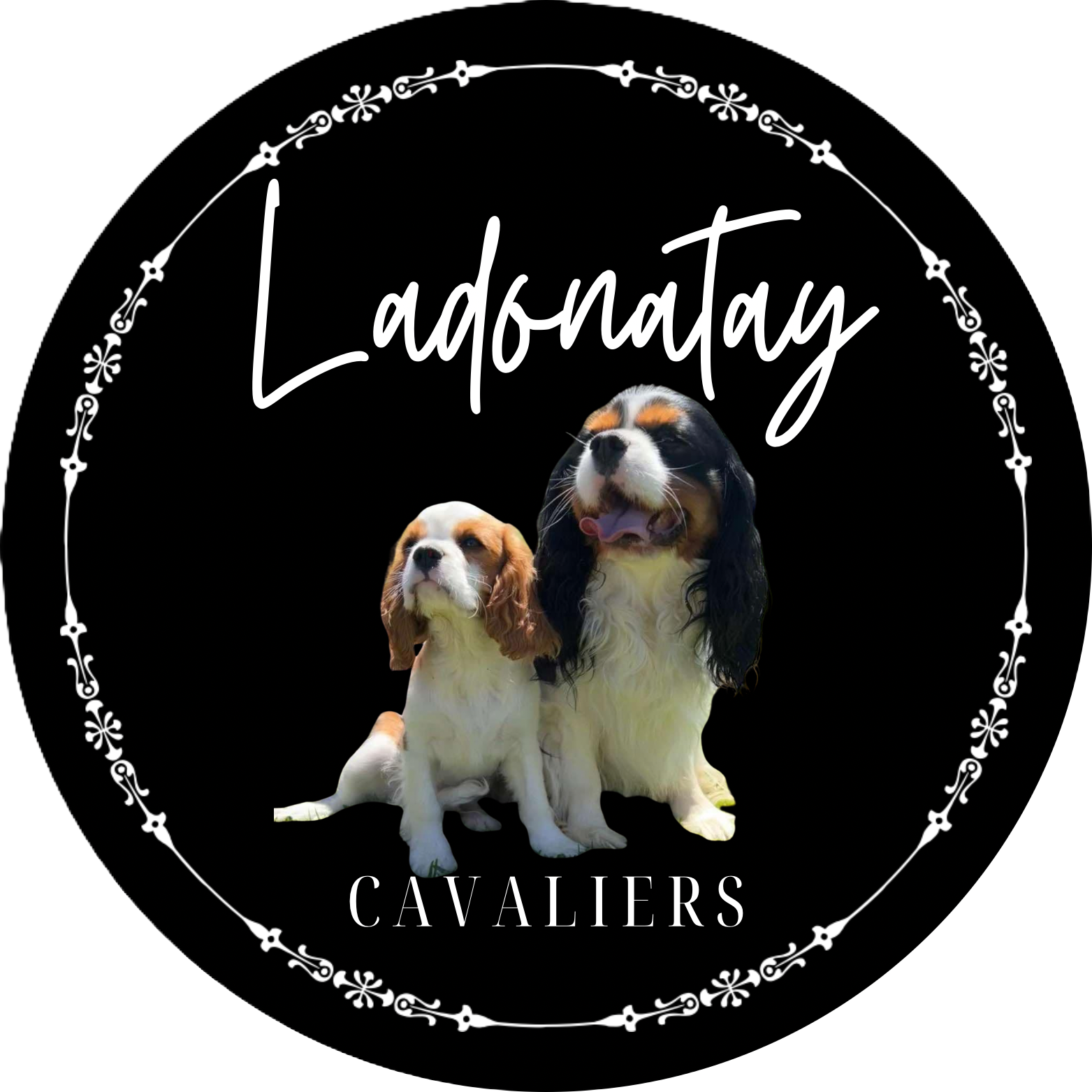Cavalier King Charles Spaniel Health
At Ladonatay Cavaliers my goal is to breed and produce a nice healthy puppy for families as pets that was true to the breed standard.
My puppies are raised with love and caring, with lots of interactions with their environment and different noises of the average household. My dogs are tested for heart and eye along with DNA testing.
All my breeding dogs are:

Full Breed DNA tested

Heart Specialist Clearance

Eye Specialist Clearance

Annual Vet Clearance
Congenital Macrothrombocytopaenia
Is a mild canine blood disease characterized by low counts of oversized platelets, typically not affecting a dog’s health or lifespan
Curly Coat Dry Eye Syndrome
Is a genetic disorder causing eye and skin problems in Cavalier King Charles Spaniels, characterized by a tight, curly coat texture,
Degenerative Myelopathy (DM)
Canine degenerative myelopathy (DM) is a disorder that occurs relatively late in a dog’s life, usually around age 8. The first signs are lameness or toe dragging in the hind legs. The disorder will persist and get worse, leading to complete paralysis of the back legs and then progression further up the body.
Episodic Falling Syndrome
Episodic falling syndrome (EFS) affects some Cavalier King Charles Spaniels, starting between 3 and 7 months. The main sign is stiff or locked muscles that may cause a dog to jerk, hop like a bunny, or walk stiffly with what is sometimes called a ‘deer stalker’ gait. These episodes are usually brief, lasting less than 5 minutes, and go away on their own. However, the length of time they last can vary. Episodes may be triggered by exercise, excitement or stress.
Eye Certificate
An eye certificate means the breeder has had their breeding dogs examined by a veterinary ophthalmologist, to confirm they are not affected by any eye conditions which may be passed down genetically to their puppies. If relevant for the breed, it also includes running DNA tests to confirm the dog is not a genetic carrier of hereditary eye diseases, such as Progressive Retinal Atrophy (PRA). It includes breeders who have participated in the Australian Canine Eye Scheme (ACES).
Heart Certificate
A heart certificate indicates that a breeding dog has been screened for heart disease such as DCM or MMVD. Auscultation alone is only accepted as a screening method if performed by a veterinary cardiologist or a GP vet certifying an OFA Basic Cardiac Screen. Echocardiography is an accepted screening method via GP or cardiologist.
Myxomatous mitral valve disease (MMVD)
This test is based on recent research that identified genetic variants associated with increased risk of early-onset myxomatous mitral valve disease (MMVD). It determines a dog’s genotype for the genetic variant referred to as NEBL3
Dogs with a G G or A G test result are less likely to be diagnosed with MMVD early in life compared to dogs with an A A result. Very few Cavalier King Charles Spaniels have the G variant, and identifying these dogs could help breeders who want to produce healthier pups.
Medium-chain acyl-CoA dehydrogenase deficiency (MCADD)
Is a condition in Cavalier King Charles Spaniels, which affects how they break down certain fats for energy.
If a dog has MCADD, they may not be able to get the energy they need when they need it. This may result in low blood sugar, seizures, coma or even sudden death.
MCADD can be managed by changing diet (avoiding certain oils), so it’s crucial to find out if your dog has the mutant form of the ACADM gene. Testing will also help inform your breeding choices.
MCADD requires two copies of the variant ACADM gene, one from each parent, to develop in dogs. It affects both males and females equally.
Carriers (one copy) won’t have MCADD but can pass the gene on to offspring.
Airway Distress Syndrome (ADAMTS3) - Risk Marker
Respiratory – Associated with the lungs and respiratory system
Severity: Moderate. This disease can cause significant signs of discomfort and/or dysfunction in affected animals. It may involve relatively high treatment/management costs, and can sometimes reduce life expectancy.
Gene: ADAMTS3
Mode of Inheritance: Autosomal Recessive
